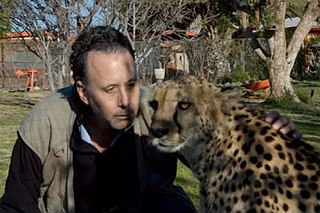A Quote by Russell Smith
Possibly the strangest book ever made, the 'Codex Seraphinianus' is an encyclopedia of an imaginary world, with illegible calligraphy - it is written in an alphabet no one can understand - and surreal drawings of odd beasts and machines.
Related Quotes
He loved a book because it was a book; he loved its odor, its form, its title. What he loved in a manuscript was its old illegible date, the bizarre and strange Gothic characters, the heavy gilding which loaded its drawings. It was its pages covered with dust — dust of which he breathed the sweet and tender perfume with delight.
The first book ever written in an alphabet was the Hebrew Bible or the Old Testament. And the most important passage was the Ten Commandments. The first commandment is the most revolutionary sentence ever written. It states: "I am the Lord thy God there is no other." The second prohibits us from making images. Thus, there is a profound rejection of any goddess influence and a ban of representative art.
Will there ever be an encyclopedia? Possibly. I would say two things about the encyclopedia: firstly, I’ve always said and I stand by it, whenever I do do a printed encyclopedia I would like all the proceeds to go to charity. Back in 1998 I never dreamt I personally I would be in the position that I could set up a large charitable foundation and personally do things for charity, and I’ve done other charity books already.
In creating the strange milieu in which your story takes place, you must first understand as well as you possibly can the familiar milieu in which your own life is taking place. Until you have examined and comprehended the world around you, you can't possibly create a complex and believable imaginary world.
The film is therefore a form of science fiction, in which humans, beasts and machines are on the verge of extinction - 'sacred motors' linked together by a common fate and solidarity, slaves to an increasingly virtual world. A world from which visible machines, real experiences and actions are gradually disappearing.
Over the last few millennia we've invented a series of technologies - from the alphabet to the scroll to the codex, the printing press, photography, the computer, the smartphone - that have made it progressively easier and easier for us to externalize our memories, for us to essentially outsource this fundamental human capacity.
Philosophy [nature] is written in that great book which ever is before our eyes -- I mean the universe -- but we cannot understand it if we do not first learn the language and grasp the symbols in which it is written. The book is written in mathematical language, and the symbols are triangles, circles and other geometrical figures, without whose help it is impossible to comprehend a single word of it; without which one wanders in vain through a dark labyrinth.
For every Book of Job, there's a Book of Leviticus, featuring some of the most boring prose ever written. But if you were stranded on a desert island, what book would better reward long study? And has there ever been a more beautiful distillation of existential philosophy than the Book of Ecclesiastes?
I write both, as you know, dozens of ecological and social scientific and historical works, dozens of novels. It's hard to describe a novel that grapples with the horrors of World War II as anything but grueling. But Codex Orféo is somehow...well, I hope, riveting for readers. Deeply provocative. Cinematic in a nearly surreal sense.





































